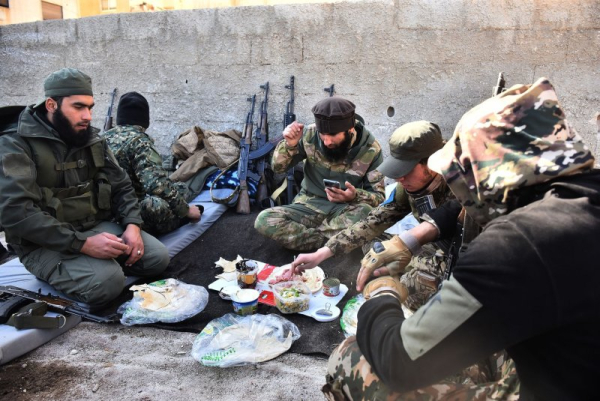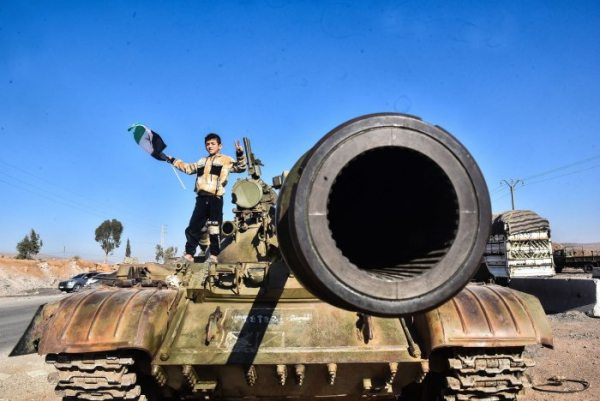
Members of the opposition forces eat as they are deployed in the liberated areas of Daraa, northern Syria, on Tuesday. Photo by Fadel Itani /UPI. | License Photo
Syrians, who suffered from the atrocities committed by President Bashar Assad’s regime for decades, have welcomed the mostly Islamist rebels who toppled him with open arms.
The rebels ended the Syrians’ nightmare and eased their fears with a good dose of moderation and assurances for the future — at least for now, opposition and military analysts said. Advertisement
Opposition forces, who fought for 14 years to free the country from the brutal Baath Party rule, never gave up. Assad never considered stepping down, leaving the country or seeking refuge until Dec. 8, when Moscow requested his immediate evacuation to Russia after the fall of Damascus.
It took the opposition forces, led by Islamist rebel group Hayat Tahrir Al-Sham, known as HST, only 11 days to bring him and his regime down in swift attacks starting Nov. 27, during which they captured the main cities of Aleppo, Hams and Homs and advanced quickly toward the capital. Advertisement
The Syrian Army already knew it was a losing battle and refrained from fighting. On his last day in power, Assad finally realized that he lost their support and left the country in a hurry without making a final speech or delegating his powers.
He simply left Syria without any command. While the soldiers were seen leaving their posts and taking off their military uniforms, the rebels from the HTS and the Syrian National Army, composed of Turkish-backed Syrian militias, fanned out inside the capital and declared it “liberated.”
They were greeted by jubilant and cheerful residents who took to the streets to celebrate Assad’s ouster and the end of 54 years of iron-fisted Baath Party’s reign under his family.
Many, however, were cautious concerning the takeover by HTS, an offshoot of al Qaeda that is listed as a terrorist organization by the United States.
Its leader, Ahmad Sharaa, who dropped using his nom de guerre, Abu Mohammed al-Jolani, and started using his real name, appears more moderate and has distanced himself from his jihadist past, when he joined al-Qaeda to fight the U.S. occupation of Iraq.
He gave the first sign of such a change on the ground when the fighters first entered Aleppo and later captured the other main cities peacefully, calling on residents, including the Christians, to resume their normal life. Advertisement
Women were assured that they will not be asked to wear the Muslim veil, alcohol will not be banned and state institutions will be rehabilitated to ensure the forming of a “strong and efficient” governance system.
That governance system depends on convincing other armed groups, some extremists, to form a “unity government” where Syria’s many ethnic and religious communities are represented and fulfill people’s aspirations for a civil state.
The quick fall of Assad, which surprised the world, came as a result of an attack that has been prepared for some time, coupled with “regional and international intersections,” according to Alia Mansour, a Syrian political activist and former political committee member of the Syrian Coalition opposition group.
“But, it was first due to the will of the Syrian people who fought for 14 years to regain their freedom,” Mansour told UPI, adding that maintaining Assad in power proved to be “costly” even for his allies, Russia and Iran.
Assad has consistently refused to engage in a U.N.-led political process to end the bloody conflict that began with peaceful protests on March 15, 2011, and escalated into a full-scale violence. More than one-half million people were killed and 12 million displaced, including 7.2 million forced to move internally for safety. Advertisement
Until the recent weeks, the ousted president still was convinced that he had won the war and regained the support of the Arab countries that lifted their boycott and invited him to their summit meetings; some even reopened their embassies in Damascus.
But he probably failed to recognize the fact that he was being “abandoned from inside,” said Turki al Hassan, a military expert and retired Syrian Army general.
“The armed forces realized that they were fighting without a cause,” al-Hassan told UPI in a phone interview from Damascus.
The war, he said, could have stopped in 2017 if Assad had accepted an international roadmap for a peace process in Syria based on the 2015 Security Council Resolution 2254, which proposed a 12-month interim phase that would end with a final settlement.
“But the liberation of Aleppo and some other areas that fell again under his control at the end of 2016 made him feel victorious,” al Hasan said. “He kept on saying ‘yes’ to the negotiations, but in fact did not want a settlement, for it would end his control over the country and move Syria to a new power-sharing regime.”
The deteriorating living conditions in regime-held areas, marked by long hours of power outages and shortages of gasoline, bread and other basic commodities, were in sharp contrast with prosperous businesses controlled by the regime’s close circles. Advertisement
Al Hassan said the past five years of Assad’s rule were “the worst,” even for his supporters who suffered to make ends meet while he and his London-born wife, Asmaa, were accumulating an opulent wealth at the expense of a population plunging into extreme poverty.
His military men were equally suffering, with a brigadier general’s monthly salary barely reaching $30. Earlier this month, Assad decided to increase the military personnel’s salary by 50% as rebel forces stepped up their attacks on northern Syria, capturing Aleppo.
“This [pay increase] is not something healthy in an institution required to fight,” Al Hassan said. “There is no Army now in Syria. … The one who is responsible for that is Assad” for fleeing without delegating his powers, prompting his generals and soldiers to drop arms and leave their bases.
Not only Syria is left without an army, but Israel also seized the opportunity of the prevailing chaos and carried out hundreds of airstrikes that destroyed 80% of the Syrian army’s capabilities, including heavy weapons and air defenses.
Mansour, the Syrian political activist, said that the moment Assad lost power, Israel started targeting the Syrian Army and destroying its assets.
“This is the biggest proof that Israel lost the one [Assad] who was protecting its borders and thus started to fear the Syrian army,” she said Advertisement
To Mansour, there was “nothing worse” than the Assad regime, explaining that the Islamists “learned from their mistakes” and know that they cannot rule the country alone. The Syrians also paid a high price to achieve freedom and a state that could protect their rights, she said.
Despite a general sense of relief for ending “the Assad’s nightmare,” Syria is not stable and has tremendous challenges ahead.
Al-Hassan highlighted the “smooth, non-violent transition” and “absence of acts of revenge,” although some looting and destruction apparently were carried out by other groups or individuals.
“There were mistakes and violations, but those who took power are not just one group controlled by HTS. … There are others who have their own ideology and practices,” he said.
What the Syrian people need, he added, is “security and safety” as a priority, but they also need to feel the change by improving their living and economic conditions.
“Lifting sanctions and opening the economy is a must,” Al Hassan said, referring to the harshest sanctions imposed on Syria by the United States in 2019, known as the Caesar Act.
Post-Assad Syria stands at a crossroads. The performance of the new leadership and its interim government can be decisive in guiding the country’s future. Advertisement
Syrian rebels take back areas controlled by Assad’s regime

A child stands atop an abandoned tank while opposition fighters spread out to areas previously controlled by Assad’s regime in the liberated areas of Daraa, in northern Syria, on December 17, 2024. Photo by Fadel Itani /UPI | License Photo